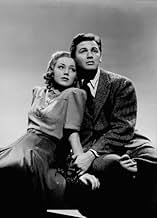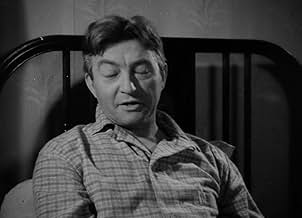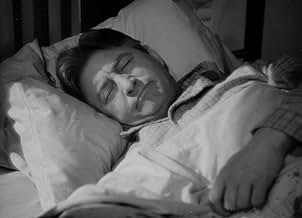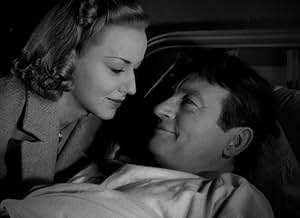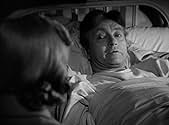Dopo essersi conosciuti come colleghi della J.B. Martin Co., la schietta ventiduenne Bobby Halevy e il venticinquenne Rims Rosson, che ha la testa tra le nuvole nell'inventare qualcosa inuti... Leggi tuttoDopo essersi conosciuti come colleghi della J.B. Martin Co., la schietta ventiduenne Bobby Halevy e il venticinquenne Rims Rosson, che ha la testa tra le nuvole nell'inventare qualcosa inutile dopo l'altra, si innamorano e si sposano.Dopo essersi conosciuti come colleghi della J.B. Martin Co., la schietta ventiduenne Bobby Halevy e il venticinquenne Rims Rosson, che ha la testa tra le nuvole nell'inventare qualcosa inutile dopo l'altra, si innamorano e si sposano.
- Regia
- Sceneggiatura
- Star
Elisabeth Risdon
- Myrtle Halevy
- (as Elizabeth Risdon)
Eddie Borden
- Clint
- (non citato nei titoli originali)
Tom Dugan
- Second Carpenter
- (non citato nei titoli originali)
Lucile Fairbanks
- Greenwich Clinic Nurse
- (non citato nei titoli originali)
Frank Faylen
- Cab Driver
- (non citato nei titoli originali)
Sam Flint
- City Hospital Doctor
- (non citato nei titoli originali)
Gus Glassmire
- Joe
- (non citato nei titoli originali)
Creighton Hale
- Stamp Collecting Mailman
- (non citato nei titoli originali)
Jack Mower
- Mac
- (non citato nei titoli originali)
Nell O'Day
- Girl at Party
- (non citato nei titoli originali)
Recensioni in evidenza
As most IMDB folks already know, this film version of Saturday's Children (SC) is derived from a Maxwell Anderson play that first appeared on Broadway in 1927. After it opened on Jan. 26th of that year, the play ran for a respectable 310 performances before closing. While another IMDB reviewer has noted that the Rimes Rosson character (performed in the film by John Garfield) was played on the stage by Humphrey Bogart, it should be pointed out that Bogart did not originate the part. That honor was given to one Roger Pryor, who sometime after the opening came down with an undisclosed illness which necessitated his being replaced by Bogart. The female lead (Bobby) was portrayed on the stage by Ruth Gordon and in this film version by Anne Shirley. Interestingly, while Bobby's family name in both the play and film is the same ("Halevy"), in the play the male lead is known as Rimes O'Neil and not Rimes Rosson as in the film. There appears to be no known explanation for this change of names, nor is there one to clarify why Bobby's family name is pronounced in the film with the accent on its first syllable. The more common way to pronounce the name "Halevy" is with the accent on the second syllable. It is possible that the film's producers were attempting to downplay the ethnic origins of that family name. We just do not know.
In any event, Bogart left the play after a few months to then assume his next role on the Broadway stage in a farce entitled "Baby Mine.". It opened on June 9, 1927 and closed unsuccessfully after just 12 performances. The play starred Roscoe "Fatty" Arbuckle, and was intended to be a comeback vehicle for Arbuckle from a well known scandal that ultimately doomed him as an actor in Hollywood.
Garfield's role in SC is not like the work he was doing at Warner Brothers at this stage of his career. He played it in a somewhat subdued and understated way that greatly enhanced both its realism and charm. Some reviewers have suggested that Garfield was miscast in this role. Others have opined that he took it on to show that he had a broader acting range than he was able to demonstrate in his previous WB films. The latter explanation seems to be the more plausible one, based upon the many examples of similar efforts made by other Hollywood actors presented with like situations. See e.g. Fred Astaire in On the Beach (1959), Gene Kelly in Inherit the Wind (1960), Lucille Ball in The Big Street (1942), Frank Sinatra in Suddenly (1954), Bob Hope in Beau James (1957) etc. Bogart's assuming an atypical (for him) romantic and comedic leading man role in Sabrina (1954) would appear to be yet another illustration of the same phenomenon. To this reviewer, Garfield was believable, likable and quite natural playing Rimes. It is possible that under the right set of circumstances, Garfield (like James Cagney and Edward G. Robinson before him) might have also developed into a reasonably successful comedic actor. Again-----unfortunately-----we will never know.
SC is a sensitive and touching film that was greatly aided by Garfield's likable and boyish performance. Special mention also must be made of Claude Rains's nuanced portrayal as Anne Shirley's warm and kindly father. The rest of the supporting cast was strong and greatly enhanced the story's Depression-era narrative.
To many filmgoers, SC is probably an unknown or forgotten movie. Because it is so endearing, SC deserves to be seen and appreciated anew by a contemporary audience.
In any event, Bogart left the play after a few months to then assume his next role on the Broadway stage in a farce entitled "Baby Mine.". It opened on June 9, 1927 and closed unsuccessfully after just 12 performances. The play starred Roscoe "Fatty" Arbuckle, and was intended to be a comeback vehicle for Arbuckle from a well known scandal that ultimately doomed him as an actor in Hollywood.
Garfield's role in SC is not like the work he was doing at Warner Brothers at this stage of his career. He played it in a somewhat subdued and understated way that greatly enhanced both its realism and charm. Some reviewers have suggested that Garfield was miscast in this role. Others have opined that he took it on to show that he had a broader acting range than he was able to demonstrate in his previous WB films. The latter explanation seems to be the more plausible one, based upon the many examples of similar efforts made by other Hollywood actors presented with like situations. See e.g. Fred Astaire in On the Beach (1959), Gene Kelly in Inherit the Wind (1960), Lucille Ball in The Big Street (1942), Frank Sinatra in Suddenly (1954), Bob Hope in Beau James (1957) etc. Bogart's assuming an atypical (for him) romantic and comedic leading man role in Sabrina (1954) would appear to be yet another illustration of the same phenomenon. To this reviewer, Garfield was believable, likable and quite natural playing Rimes. It is possible that under the right set of circumstances, Garfield (like James Cagney and Edward G. Robinson before him) might have also developed into a reasonably successful comedic actor. Again-----unfortunately-----we will never know.
SC is a sensitive and touching film that was greatly aided by Garfield's likable and boyish performance. Special mention also must be made of Claude Rains's nuanced portrayal as Anne Shirley's warm and kindly father. The rest of the supporting cast was strong and greatly enhanced the story's Depression-era narrative.
To many filmgoers, SC is probably an unknown or forgotten movie. Because it is so endearing, SC deserves to be seen and appreciated anew by a contemporary audience.
This version of Saturday's Children is the third film version of a popular Maxwell Anderson play that ran for 326 performances on Broadway during the 1927-28 season. It's a story of young love with sad to say a most miscast John Garfield.
Of course Garfield might not have thought so since back on stage the role he plays as the young calf-eyed Rube Goldberg inventor was originated by none other than fellow Warner Brothers tough guy Humphrey Bogart. Hard to believe, but Bogey on stage played those kind of roles until The Petrified Forest changed his image. He and Ruth Gordon starred in the stage version.
But image is everything and Garfield's similar image of a tough guy was set in the mind of the movie-going public then. Garfield insisted on doing this film and Jack Warner gave in. But when it flopped at the box office and it did, Warner was ready with the 'I told you so'.
A silent version was done with Grant Withers and Corinne Griffith in 1928 and Warner Brothers later did the story again in 1935 with a more suitable Ross Alexander in the lead opposite Gloria Stuart.
I suppose it was the thing back then for young marrieds to live with their parents. This film has Garfield and Anne Shirley living with her parents, Claude Rains and Elizabeth Risdon, along with other married sister Lee Patrick and her husband Roscoe Karns. No wonder these two want a little privacy.
Rains brings Shirley to work in the office where he is a clerk and there she meets Garfield whom she falls for. Garfield is like George Bailey, a guy with an itch to do great things and sees an opportunity in the Phillipines for adventurous type work. But now he's got a wife who doesn't quite share that disposition.
The best performance in the film belongs to Claude Rains. He almost makes quite the sacrifice to keep our young folk together.
Even with a John Garfield that you can't quite get over, Saturday's Children is a nice film about people in love. That's a formula that always sells.
Of course Garfield might not have thought so since back on stage the role he plays as the young calf-eyed Rube Goldberg inventor was originated by none other than fellow Warner Brothers tough guy Humphrey Bogart. Hard to believe, but Bogey on stage played those kind of roles until The Petrified Forest changed his image. He and Ruth Gordon starred in the stage version.
But image is everything and Garfield's similar image of a tough guy was set in the mind of the movie-going public then. Garfield insisted on doing this film and Jack Warner gave in. But when it flopped at the box office and it did, Warner was ready with the 'I told you so'.
A silent version was done with Grant Withers and Corinne Griffith in 1928 and Warner Brothers later did the story again in 1935 with a more suitable Ross Alexander in the lead opposite Gloria Stuart.
I suppose it was the thing back then for young marrieds to live with their parents. This film has Garfield and Anne Shirley living with her parents, Claude Rains and Elizabeth Risdon, along with other married sister Lee Patrick and her husband Roscoe Karns. No wonder these two want a little privacy.
Rains brings Shirley to work in the office where he is a clerk and there she meets Garfield whom she falls for. Garfield is like George Bailey, a guy with an itch to do great things and sees an opportunity in the Phillipines for adventurous type work. But now he's got a wife who doesn't quite share that disposition.
The best performance in the film belongs to Claude Rains. He almost makes quite the sacrifice to keep our young folk together.
Even with a John Garfield that you can't quite get over, Saturday's Children is a nice film about people in love. That's a formula that always sells.
Knowing what we know about the period 1940 and the years that preceded and succeeded this film, a world war was underway and rationing and sacrifices were having to be made by all businesses and families. These two young lovers Bobby Halevy (Anne Shirley) and Rims Rosson (John Garfield) met on Bobby's first day of work at her new job. It becomes quite evident that Bobby plays coy but she knows what she wants and how to get it. As the 2010 Beyonce Knowles song Single Ladies (Pit A Ring On It) goes, the young and very attractive Bobby wants to get married to the gullible and loved starved Rims and she quickly develops a plan to catch her fish.
The film moves along at a quick pace with each conversation talking rapidly just like it most likely did when it was first delivered as a stage play. This is a simple picture about a young couple just starting their lives together when the war efforts directly impacts their ability to maintain a living and possibly to starting a family of their own.
It is a simple story filled with both family hardships and romance and keeping in mind that WWII was underway filmgoers were looking for some glimmer of hope which Anne Shirley and John Garfield deliver. Claude Rains plays Anne Shirley's father with the charm of a lucky leprechaun which is an added bonus.
I give this eighty (80) year old classic film a decent 8 out of 10 IMDB rating
The film moves along at a quick pace with each conversation talking rapidly just like it most likely did when it was first delivered as a stage play. This is a simple picture about a young couple just starting their lives together when the war efforts directly impacts their ability to maintain a living and possibly to starting a family of their own.
It is a simple story filled with both family hardships and romance and keeping in mind that WWII was underway filmgoers were looking for some glimmer of hope which Anne Shirley and John Garfield deliver. Claude Rains plays Anne Shirley's father with the charm of a lucky leprechaun which is an added bonus.
I give this eighty (80) year old classic film a decent 8 out of 10 IMDB rating
This film is a comedy with sad parts. If you want to see the past, the fashions, the way women were treated, or just escape from modern films, you might enjoy this. I watched it solely for Claude Rains, but found the female lead to be very likable and certainly very pretty. A girl of 22 meets a man at her new job, and they begin a solid friendship. I liked that she wasn't a typical girlie-girl, trying to catch a man. She was a person first and very honest. It's her sister who is determined the two must marry. The marriage runs into trouble mostly due to finances--nothing much has changed in America, has it! Claude Rains is absolutely charming as ever, kind, gentle, funny, and very devoted to his daughter. It shocked me that a 1940s film, or any father, would tell his daughter it was OK for girls to sow some "wild oats" as well as boys! Dad's action toward the end of the film shocked me as well, and overall this was a fairly poorly written, unrealistic kitchen-sink drama. However, Anne Shirley is so lovely and likable, and Claude Rains is wonderful. Great to see him not playing a villain or an overly intense individual for once (though he did that so well!) Worth seeing for those two actors. Without them, it would be a miss.
Anne Shirley was utterly captivating; I had never before seen her work. I had seen Claude Rains as a child but had forgotten him. It was quite enjoyable to see his portrayal of a goofy, yet devoted father.
I thought the movie was quite interesting. This is quite amazing as I do not usually enjoy movies from that era. I consider this a holdover from the 1930's; it has "depression and coming war" written all over it.
The questions the movie raised, however dated the movie, were familiar: how do young marrieds survive financially? Should men marry before they have achieved their financial goals? When, or if, should young married women drop out of the work force in order to raise a family? These are questions as difficult today as they must have been nearly 7 decades ago. The most interesting aspect was that these problems existed at all: we tend to think today that these are merely modern questions.
In spite of its "1930 style" I found it riveting; all the more so when one realizes that its stars are all gone, like the era it portrayed.
I thought the movie was quite interesting. This is quite amazing as I do not usually enjoy movies from that era. I consider this a holdover from the 1930's; it has "depression and coming war" written all over it.
The questions the movie raised, however dated the movie, were familiar: how do young marrieds survive financially? Should men marry before they have achieved their financial goals? When, or if, should young married women drop out of the work force in order to raise a family? These are questions as difficult today as they must have been nearly 7 decades ago. The most interesting aspect was that these problems existed at all: we tend to think today that these are merely modern questions.
In spite of its "1930 style" I found it riveting; all the more so when one realizes that its stars are all gone, like the era it portrayed.
Lo sapevi?
- QuizJames Stewart was to play "Rims Rosson" but was replaced by John Garfield. Jane Bryan was to play "Bobby Halevy", but she retired to get married and was replaced by Olivia de Havilland, who was suspended after she refused the part. Una Merkel had the role of "Florrie Sands" but was replaced by Lee Patrick after she became ill.
- BlooperThe credits of this film say "Based on the Pulitzer Prize play by Maxwell Anderson." The play did not win the Pulitzer Prize, but Anderson won the 1933 Prize for another play, "Both Your Houses".
- Citazioni
Willie Sands: Two can live as cheap as one... if one don't eat!
- ConnessioniFeatured in The John Garfield Story (2003)
- Colonne sonoreLa Cucaracha
(uncredited)
Traditional
Played as dance music at the going away party
I più visti
Accedi per valutare e creare un elenco di titoli salvati per ottenere consigli personalizzati
Dettagli
- Data di uscita
- Paese di origine
- Lingue
- Celebre anche come
- Married, Pretty and Poor
- Luoghi delle riprese
- Manhattan, New York, New York, Stati Uniti(opening establishing shots - archive footage)
- Azienda produttrice
- Vedi altri crediti dell’azienda su IMDbPro
- Tempo di esecuzione
- 1h 42min(102 min)
- Colore
- Proporzioni
- 1.37 : 1
Contribuisci a questa pagina
Suggerisci una modifica o aggiungi i contenuti mancanti

